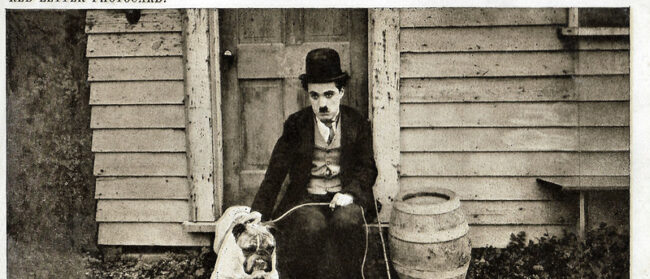No electricity, just a few books and a massive river crossing. Rural villages were what first-time author Ian Masters, 49, grew up with and what gave him scope for imagination throughout his life as a British youth in a faraway land.
As a child, Masters spent long hours just looking at the river near his parents’ house in former Zaire, now the Democratic Republic of Congo, wondering where people and their stories came from.
Some 40 years later, he became the author of one of those long-dreamed stories.
In his first novel, Charlot, Masters dives into the personal struggle of famed comedian Charlie Chaplin as he tries to come to terms with the two sides of his personality while on a journey in then-French Indochina in 1936. In Charlot, a fictionalised retelling of real-life events, Chaplin sheds his “Little Tramp” persona to find his own voice and a new sense of humanity amid Cambodia’s political turmoil.
“This novel is a testament to the power of storytelling and the power of narrative to connect people and create meaningful connections,” Masters said.
Masters worked as a writer in the TV, film and radio industries for well over a decade before moving to Cambodia in 2010. There, in 2013, he started working on a TV comedy series, “Love9” for BBC Media Action, and began researching Chaplin’s trip to the region.
“We were developing a character for the show, and the team suggested the name ‘Charley’, to be modelled on ‘Saklo’, a Khmer corruption of Charlot, (which was) the French name for Charlie Chaplin,” Masters told the Globe. “I soon discovered that Chaplin was still a significant influence on comedians in Cambodia, who often sported his signature toothbrush moustache. … But more than that, I found out he’d actually visited Indochina in 1936 on an extended vacation after the release of ‘Modern Times’.”
Masters sought to examine who Chaplin was in this pivotal period of the comedian’s career – that of a middle-aged man, then 47, on the verge of being eclipsed by technology. Chaplin had pledged never to produce another film, but during his trip to Indochina, something changed, pivoting him from silent movies to talkies, from social comedy to political satire.
The fictionalised account of burgeoning doubt in Chaplin’s life may strike readers as Masters’ method of describing the normal progression of a midlife crisis. Certainly, many people who thought they had discovered their true selves by their 40s are hit by a wave of unexpected upheaval that brings buried identity issues to the surface.
Masters was almost exactly Chaplin’s age when he decided to grab his laptop and write this story during the 2020 Covid pandemic. Beginning with a 2,000-word screenplay, Masters quickly expanded upon his character’s history, blending fact with fiction to create the novel.
A reader of Charlot could easily wonder about an unspoken link between Chaplin’s and Masters’ lives. While Chaplin was moving from silent movies to “talkies”, Masters is transitioning from being a multi-awarded screenwriter to a novelist.
The author told the Globe more about his journey.
Before this book, had you ever thought of becoming an author/novelist?
After my childhood in Congo, I moved back to the U.K. and really loved English literature. I got very involved in theatre and studied English literature at the University of Cambridge. I wasn’t really thinking about writing novels at that time, but I certainly started playing with my writing and imagination. I remember starting to write my first novel in the back of my physics book when I was about 12. I don’t recall having ever finished it.
I then grew more into screenwriting and in 1999, my partner and I set up a screenwriting training programme in Ghana, Sri Lanka, Pakistan and Sierra Leone, where we worked with new writers, new voices and making tonnes of short films.
I did my Masters in screenwriting, but mainly it was just this fascination of listening to people’s stories in different places and trying to think about what to do with all that raw material. You know, as an expert, you’re exposed to lots of weird and wacky character situations, and you try to turn those into stories.
Do you somehow personally relate to the life of Charlie Chaplin? Why this deep interest in him? Do you feel that your lives are somehow similar?
Obviously, my life doesn’t connect with Charlie Chaplin at all. He’s a complete genius, but I think there are things that artists and writers struggle with, as he did to a certain degree.
One of the first memories I have about Chaplin’s work is being back in the U.K. after years in Congo and sitting in a room with an eight-metre projector showing Charlie Chaplin in “Mabel at the Wheel.” To be honest, I hadn’t really thought about it that much until I was in Cambodia a few decades later.
That time, I showed my daughter some of Chaplin’s films and she absolutely adored them, even though she’s a YouTuber-kind of generation.
I then started reading more and more about Chaplin’s life, and I noticed that lots has been done about the early period in his life, but far less about his later life when he was in his middle age.
And obviously, I was getting to my middle age as well and thinking, “Well, what are the kind of questions that artists and filmmakers and writers grapple with?”
People didn’t want the Tramp to speak, but they also needed him to speak because that’s what technology was demanding, and in the end, he had to “kill” the Tramp in order to speak in his own voice in “The Great Dictator.” But after that, his later films and his last few films, you know he was exiled from Hollywood. He was pretty much chucked out.
So that process of struggling with your voice, firstly, trying to find out what your voice is, not trusting your voice, and having all of that impostor syndrome is what I relate the most with Chaplin’s life.
So now, with this in mind, how did you unfold each chapter of your book?
It started off as a screenplay. I had written this story all the way through to the end in the form of a screenplay. I thought I’d come and paste that into a Word document and just add some adjectives to make it more fun.
Turned out it wasn’t as easy as that. I obviously had to transpose it from a screenplay into a novel.
I didn’t want to write another of his biographies. There were already too many of those around. So it was a bit of a challenge to create enough of a fictional story that wouldn’t impact the biographical truth of his life.
But, fortunately, I already had the story in screenplay format. So, when it came to writing the novel, some of it felt very mechanical. It was like I was just transposing scenes into chapters.
Are you planning to write more books?
I’d love to. Although I’m still writing screenplays at the moment.
My great-grandfather grew up and worked a lot in Congo and he self-published some novels. I was quite interested in talking with my grandfather about these novels and possibly transposing them into a new book. But that would be more of a kind of introspective piece if you like.
I’m also halfway through a novel, which is more about expat life in Cambodia at the moment. A lot lighter and fun and on the historical fiction side of things.
But first, I’m kind of waiting to see how Charlot goes.
What kind of impact are you hoping this book will have on its readers?
Well, I hate that the love for Chaplin is slowly fading away. I’d love to see people get into Chaplin’s work again.
I’d love people to really engage with this book and get some takeaways from the journey with a character they thought they knew, but they’ve learned something more about.
It would also be fascinating to see it made into a movie because I think that’s when it really comes alive.
Do you have any advice for aspiring writers?
Don’t doubt yourself. So I’ve been writing for a long time since I started writing this novel. The advice is, don’t censor yourself. Just have fun with what it is you’re trying to say and try and speak truthfully to it.
* Charlot will be published in October by Monsoon Books. Read an excerpt here.




